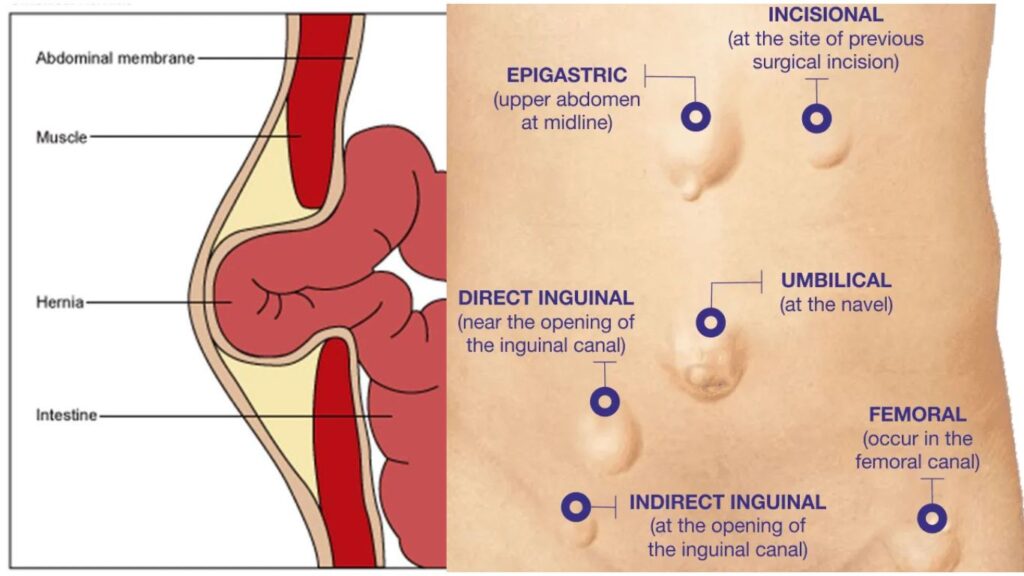Hernia Warning Signs: What to Look Out For
Hernia is a medical condition that can affect people of all ages and genders. It occurs when an organ or fatty tissue pushes through a weak spot in the surrounding muscles or connective tissues. Hernias can be uncomfortable and may require medical intervention for proper management. Understanding the warning signs of hernia is essential for timely diagnosis and treatment. In this article, we will explore the different types of hernias, their warning signs, available treatment options, and preventive measures.
Introduction
Hernias are a common medical condition that affects millions of people worldwide. They can occur in various parts of the body, including the abdomen, groin, and diaphragm. When left untreated, hernias can cause pain, discomfort, and complications that may require surgery. Recognizing the warning signs of hernia is crucial for prompt medical attention and appropriate treatment.
Understanding Hernia
Definition and Types of Hernia
A hernia is characterized by the protrusion of an organ or tissue through a weak spot in the surrounding muscles or connective tissues. The most common types of hernias include inguinal hernia, femoral hernia, umbilical hernia, hiatal hernia, and incisional hernia. Each type has specific characteristics and potential complications associated with it.
Common Causes of Hernia
Hernias can be caused by a combination of factors, including age, genetics, and lifestyle choices. Some common causes of hernia include weakened muscles due to aging, excessive strain on the abdominal area, obesity, chronic coughing or sneezing, and previous surgical incisions.
Risk Factors Associated with Hernia
Certain factors can increase the risk of developing a hernia. These include a family history of hernias, being overweight or obese, engaging in activities that involve heavy lifting or straining, having a persistent cough, or experiencing constipation.

Recognizing Hernia Warning Signs
Common Symptoms of Hernia
The symptoms of hernia can vary depending on the type and severity of the condition. However, some common symptoms include a visible bulge or lump in the affected area, pain or discomfort during physical activities, aching or burning sensation, and a feeling of heaviness or pressure.
Specific Warning Signs for Different Types of Hernia
Different types of hernias may have specific warning signs that can help in their identification. For example, an inguinal hernia may present as a bulge in the groin area, while a hiatal hernia can cause symptoms like heartburn, chest pain, and difficulty swallowing.
Seeking Medical Attention
Importance of Consulting a Healthcare Professional
If you suspect you may have a hernia or are experiencing any symptoms associated with hernia, it is important to consult a healthcare professional. A medical evaluation can help determine the type and severity of the hernia and guide the appropriate course of treatment.
Diagnostic Methods for Hernia
To diagnose a hernia, a healthcare professional may perform a physical examination, review the patient’s medical history, and order additional tests such as ultrasound, MRI, or CT scan. These tests help in confirming the presence of a hernia, identifying its location and size, and assessing any potential complications.
Treatment Options Available
The treatment approach for hernia depends on several factors, including the type of hernia, its size, symptoms, and the individual’s overall health. In some cases, watchful waiting with regular monitoring may be recommended, while in others, surgery may be necessary to repair the hernia. Other treatment options, such as lifestyle modifications and the use of supportive garments, may also be suggested.
Preventive Measures for Hernia
Lifestyle Changes to Reduce the Risk of Hernia
While not all hernias can be prevented, certain lifestyle changes can help reduce the risk of developing one. Maintaining a healthy weight, avoiding excessive lifting or straining, practicing good posture, and treating conditions that cause persistent coughing or constipation can contribute to preventing hernias.
Tips for Maintaining a Healthy Weight
Maintaining a healthy weight is important for reducing the risk of hernias. Regular exercise, a balanced diet rich in nutrients, portion control, and avoiding smoking and excessive alcohol consumption are some strategies that can help in achieving and maintaining a healthy weight.
Living with Hernia
Coping Strategies and Self-Care Techniques
Living with a hernia can be challenging, but there are several coping strategies and self-care techniques that can help manage the condition. These include avoiding activities that exacerbate the symptoms, practicing gentle exercises approved by healthcare professionals, using supportive garments, and adopting stress-reducing practices like meditation or yoga.
Support Networks and Resources for Hernia Patients
Connecting with support networks and resources can provide valuable information, guidance, and emotional support for individuals living with hernia. Support groups, online forums, and educational materials offered by healthcare organizations can help individuals navigate their hernia journey and share experiences with others facing similar challenges.
Conclusion
Recognizing the warning signs of hernia and seeking timely medical attention is crucial for effective management and treatment. By understanding the different types of hernias, their symptoms, available treatment options, and preventive measures, individuals can take proactive steps to minimize the impact of hernia on their lives. Remember, early detection and appropriate care play a vital role in optimizing outcomes and enhancing the overall quality of life for hernia patients.
Frequently Asked Questions (FAQs)
- Can hernia go away on its own?
- Hernias do not typically resolve on their own. Medical intervention is usually required to repair the hernia and alleviate symptoms.
- Is it safe to exercise with a hernia?
- It is important to consult a healthcare professional before engaging in any physical activity if you have a hernia. They can provide guidance on suitable exercises and precautions to take.
- Can a hernia cause complications?
- In some cases, hernias can lead to complications such as strangulation or obstruction of the protruding organ or tissue. These complications require immediate medical attention.
- Can hernia affect fertility in men or women?
- Hernias themselves do not directly affect fertility. However, certain complications related to hernias, such as testicular torsion in men, may have an impact on fertility.
- Are there any alternative treatments for hernia?
- While surgery is the most common treatment for hernia, some alternative therapies may help manage symptoms, such as hernia belts or trusses. However, these should be used under medical supervision.





Of course, what a great site and enlightening posts, I surely will bookmark your blog.All the Best!